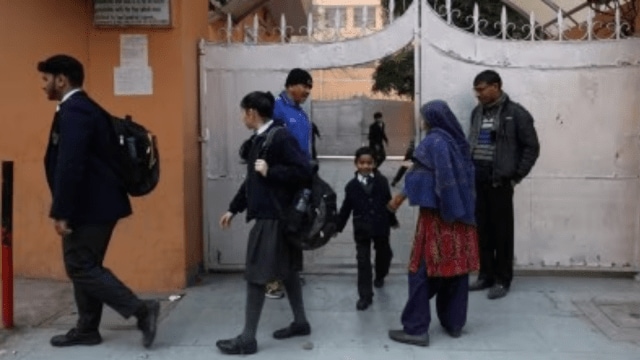
April has been a tumultuous month. School results have been declared; large numbers were detained in government schools, especially in Class XI, to stop them from doing badly in Class XII and tarnishing the record of schools. Poor families are in despair about what lies ahead. Having tried, often unsuccessfully, to help girls get admitted to the National Institute of Open Schooling, I know the problems — the distances to the centres for enrolment, practical sessions and examinations — which poor families cannot handle. This year, elite schools have held back children in Classes VI and VII; the Right to Education (RTE) Act (recently amended) bans detention in elementary school, except in Classes V and VIII. Parents complained but no action seems to have been taken.
For those promoted to the next class, the new quarterly fee slips have brought shocks. Upper middle-class parents are protesting on the streets against the fee hikes by private schools. Students of Delhi Public School, Dwarka, whose guardians questioned the increased fee, were harassed, even barred from using the canteen and meeting friends. The Delhi High Court stepped in, saying the school was working “like a money-making machine”, and forbade discrimination. But discrimination is writ large in our system.
In this medley, the Delhi Police are set to make an entry, with “a knock on the door” at the home of any child who may have dropped out of a government school. The Delhi government has directed the automatic sharing of data on school dropouts every six months with the Delhi Police. Dataveillance and data privacy are major issues in the realm of children’s rights that need legal redress. As per a report (“Delhi Police to check on govt school dropouts, for ‘counselling, career’”, IE, April 22), the new government discussed with Delhi Police the list of dropouts and the formation of anti-drug clubs. Last year, 85 per cent of those involved in crimes were first-timers; the police will track down the dropouts “who are doing nothing” and “counsel” them towards a better career.
We know the import of a “knock on the door” by the police; more so in the case of poor Muslim or Dalit children. It is worrying when seemingly noble intentions essentialise “dropouts” as potential criminals or drug pushers.
Schools label and normalise the sifting of our children by calling them “dropouts”, when in fact they are “pushed out” by the system. Children do not decide to drop out of their own volition. They are not included with dignity and care in the process of schooling, with respect for their knowledge, in their own languages. Alienated by the content of their lessons and overwhelmed with routines that make little sense, they are humiliated by being called “slow learners”. This can happen to any child, whether from an educated family or a first-generation learner. When children from privileged families find their school lessons uninteresting, or feel demotivated, the system tries to make sure that they do not “drop out” — at times in ways that are questionable. We have questioned why official data on “dropouts” states the reason as “children being disinterested in studies”, rather than accepting that “children find their studies uninteresting”. Moreover, those deprived of support and resources at home are also those who unjustly do not get good schools, good teachers and an enriching learning environment.
The Constitution calls for equity and social justice, with free education for all, to nurture democracy. The RTE Act came 60 years later. RTE is, however, not being implemented in full measure. It is contradicted by the National Education Policy (NEP), 2020, which upholds standardised tests that detain children in Classes V and VIII. RTE originally mandated school-based continuous assessment as part of learning, and no centralised testing till Class VIII. The NEP envisages pushing half the children into vocational education courses at an early age. Increased funding has been directed to a few exemplar schools, central support to the public system in states is decreasing and better-performing states are being penalised for not consenting to the requirements of the NEP.
How many of us from the educated middle classes have protested, with banners calling for Free Public Schools for every child? Most countries we wish to vie with have long-established good-quality public education systems. Indeed, how many of us have demanded the dismantling of a highly unequal stratified government school system? Governments compromised with quality and equity, offering poor schools to the poor, inadequate resources and teachers; with few tokenistic ‘Model’ schools. This gave way to the commercial market, with a more deeply stratified private system – ranging from exorbitant fee-charging international schools to ‘low-cost private schools for the poor’. This is creating an apartheid; 12-year-olds in elite schools say that the government should not waste money giving “poor children ‘our’ knowledge of science, mathematics and English”, but should teach them skills of carpentry, making gol-gappa, shoes etc. Children in government schools want shared spaces to learn about and from each other. As one said: “All children should share similar kinds of schools so that poor children can improve their understanding and learn to fight for their rights”. The government is not listening to those in government schools. Is the Constitution listening?
The writer is professor, DU and former chairperson, NCERT primary textbook development committees